The Arab citizens of Israel stand in a peculiar position regarding their Palestinian identity and integration into Israeli society. Looking at Arab society in Israel today, one struggles to identify a common belief, path and function as a unified minority with one clear goal for the political future of the Arab community and its role in the Israeli-Palestinian conflict. This ultimately stems from the binary national identity options presented to the Arab community.
Israel has placed the Arab citizens of Israel in an impossible position. The average Arab citizen of Israel sees a binary option: You are either Palestinian or Israeli and there is nothing in between. In this limited and binary identity, your choice reflects your political and national positions and beliefs. Many choose the Palestinian identity, as it is an identity based first and foremost on peoplehood, a concept the Israeli society at large struggles to accept.
The defining factor in the political identity of the Palestinian people is the 1948 War. The citizenship of the young generations and future generations of Palestinians, whether it is Palestinian, Israeli, foreign or refugee, is the result of the fate of the grandparents. Wherever the grandparents ended geographically, either within territories that became part of Israel, the West Bank, or as refugees, it sealed the fate of their future generations.
For us, Arab citizens of Israel, we understand that we could have very easily been in the position of that of someone from the West Bank, Gaza, or as a refugee. Thus, we cannot cut ties with the rest of the Palestinian people and simply become “Arab Israelis,” as the common term used in Israel.
Palestinian identity in Israel today
The concept of Palestinian identity is widely unaccepted within Israel – again, as it is considered solely as a national identity. Thus, the politically correct term used to describe the Arab community is “Arab citizens of Israel”, or the common phrase in Israel “Israeli-Arabs.” The identity Israel places on its Arab citizens by completely ignores the complex identity of the Arab citizens and the Palestinian peoplehood. This is done as the Palestinian identity is considered and interpreted as a national identity, one that undermines the right of the existence of the state.

The problematic nature of this binary position for the Arab community is not merely a philosophical one. This situation also has implications for tangible real-life issues. First and foremost, the recognition of the Palestinians as a people and the recognition of the history of the Arab citizens of Israel will further relations between Arab citizens and Israelis, and will ultimately lead to furthering the integration of Arab citizens into Israeli society, as it will not come at the expense of their own identity.
Furthermore, one example that comes to mind is the never-ending discussion over equal duties for equal rights. While Jewish Israelis serve in the army after high school, Arab citizens who do not face conscription can start working or studying at a university. There is a consensus regarding conscription for Arab citizens, especially considering the aforementioned element of identity. Nevertheless, there is still a question regarding Arab participation in the National (Civic) Service instead.
Last week, on the popular morning radio show Kalman-Liberman, Kalman Liebskind asked MK Mansour Abbas about this particular issue. Liebskind wondered why is the National Service option not popular among Arab citizens. Adding that the name has changed to “Civic” service to remove national connotations and the fact that the service for Arabs is done specifically in institutions that serve their own communities, such as hospitals, clinics, schools, etc.
LIBESKIND WONDERED if this is because Arab citizens translate this as normalization with the state and recognition of it. Abbas did not agree with this sentiment and stated that changing the name does not immediately change the connotation of the national service and that a new program must be done in partnership with the Arab community rather than being imposed upon it.
While Abbas is correct in his assessment of the problematic nature of the national service, Liebskind is correct in his assessment, as well. However, the rationale behind this sentiment in the Arab community must be explained. In the existing binary identity option, acceptance of certain elements of Israeli institutions has been translated as choosing an Israeli identity over a Palestine one.
Is accepting the Israeli identity a burden for Arabs?
The acceptance of an Israeli identity may translate directly into a betrayal of the Palestinian identity and complete support for the actions of the state regarding the Palestinian people in the West Bank and Gaza Strip. Other examples of this phenomenon are the lack of Arab recruitment by the police and for some even voting in Israeli parliamentary elections.
For years, Israel disregarded the Palestinian identity of Arab citizens, favoring an identity that Israeli society can accept without diving into complexity. However, the solution for this issue and its implications is embracing complexity rather than simplifying it. Instead of referring to the Arab citizens as just Israeli-Arabs, a new identity must emerge and be embraced; a complex identity that incorporates all elements of the identity of Arab citizens, rather than choosing some elements over the other. This identity is what I refer to as the identity of Arab-Palestinian-Israelis.
As aforementioned, there is no unifying identity thus far that holds together all Arab citizens of Israel. Rather, Arab citizens stand somewhere on a spectrum that extends from one extreme of Arab citizens who do not recognize the existence of Israel and work actively against it, to the other extreme who do not see themselves as only Israelis and are willingly serve in the army. Individuals within the Arab community stand somewhere in between these two extremes, pulled a bit more to one side than the other in different stages of life or dependent on their education and values.

This Arab-Palestinian-Israeli identity can serve as an umbrella that covers the vast majority of Arab citizens. The recognition of the identity, story, history and complexity by Israel will serve both sides and will strengthen relations between Arab citizens and Israel, which will serve the interest of all. Thus far, Arab citizens have a sense of distrust and suspicion. This must be addressed and turned into trust and mutual understanding. When Arab citizens have their identity recognized within the boundaries of Israel, Arab citizens will take a more active role in society, increasing civic service, police recruitment and more.
This new identity can take the Arab community forward, integrate more comfortably into Israeli society and play an active role in reaching agreements with the Palestinian people in the West Bank and Gaza Strip to find political solutions to the ongoing conflict. Rather than being an unknown community to many in the world and one that is disregarded in the Israeli-Palestinian conflict, the Arab citizens of Israel can take the lead.
The Arab community alone can understand both sides of the conflict, as it lives and is exposed to both realities. Thus, the Arab community has the capacity to lead mediation and negotiations between the two sides of the conflict and to take both parts of their identity, Israeli and Palestinian, forward.
